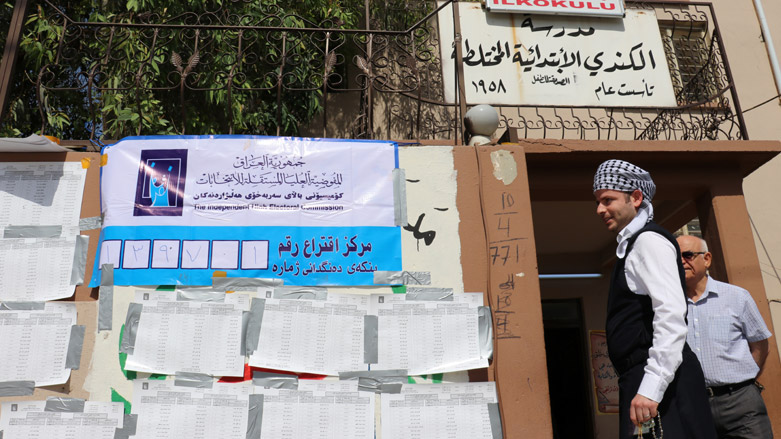Convoluted list of coalitions, parties, and candidates reflects complex Iraqi political landscape

ERBIL (Kurdistan24) – Voters taking part in Iraq’s parliamentary elections will have to pick from hundreds of candidates, parties, and coalitions as the country’s diverse political landscape offers up a number of choices.
Iraq’s parliamentary elections are currently underway as thousands of people across the country’s diverse provinces and regions head to the polls.
There are 320 political parties, coalitions, and electoral entities running in the 2018 Iraqi elections, with some 7000 candidates vying for a seat in Iraq’s Parliament.
Below is a breakdown of the competing parties:
Leading coalitions in the Iraqi Parliamentary
Prominent parties and alliances in Iraq’s 2018 elections are as follows:
State of Law Coalition: Led by Nouri al-Maliki, Hamad Musawi, Yassir Sakhel and Ali Maliki are the more popular candidates among Iraq’s southern provinces.
Kurdistan Democratic Party (KDP): Headed by former Kurdistan Region President Masoud Barzani, the largest Kurdish party is participating in the election but opted not to run any candidates in the Kirkuk province which they have described as occupied territory by Iraqi forces.
Victory (Nasr) Coalition: In reference to the victory over the Islamic State (IS), Haider al-Abadi, the incumbent prime minister, leads a coalition of independents and is allied with the Iraqi National Congress Party.
Fatih Coalition: Led by Hadi Al-Amiri, the alliance includes the Badr Organisation, Asa'ib Ahl al-Haq, Kata'ib Hezbollah, Kata'ib al-Imam Ali, all key components of the Iranian-backed Shia Hashd al-Shaabi militia, also known as the Popular Mobilization Forces (PMF).
Revolutionaries for Reform Alliance: Headed by Muqtada al-Sadr, the coalition includes Iraq’s Communist Party, Istiqama Party, and independents Muzir Shawkat, Saad Asim Jenabi, and Adnan Azaqi.
Al-Wataniya: Prominent members are Ayad Allawi, Salim al-Jabouri, Salih Mutlag, and tribal leaders in the Nineveh and Anbar provinces.
Muttahidoon: A Sunni political coalition led by Osama al-Nujaifi, one of Iraq’s current Vice-Presidents.
Civilized Alliance: Headed by Faiq Al-Sheikh Ali.
The Kurdistan Region’s Patriotic Union of Kurdistan, Gorran Movement, Kurdistan Islamic Union (KIU), Komal (or Kurdistan Islamic Group (KIG)), and the CJD are all competing as separate lists within the Kurdistan Region. An unnamed coalition between Gorran, Komal, and the Coalition for Justice and Democracy (CJD) led by Barham Salih in the disputed territories only.
Other sizeable coalitions include Al-Anbar Coalition, Diyala Coalition, Salahaddin Coalition, Turkmen Coalition, Arabic Coalition, and the Al-Anbar Alliance.
There are 27 coalitions, 205 political entities, and 88 different electoral lists competing for seats in the Iraqi Parliament. Each province received an allotted number of seats, and members of Iraq’s minority ethnic groups have nine seats reserved in Baghdad.
Editing by Nadia Riva
